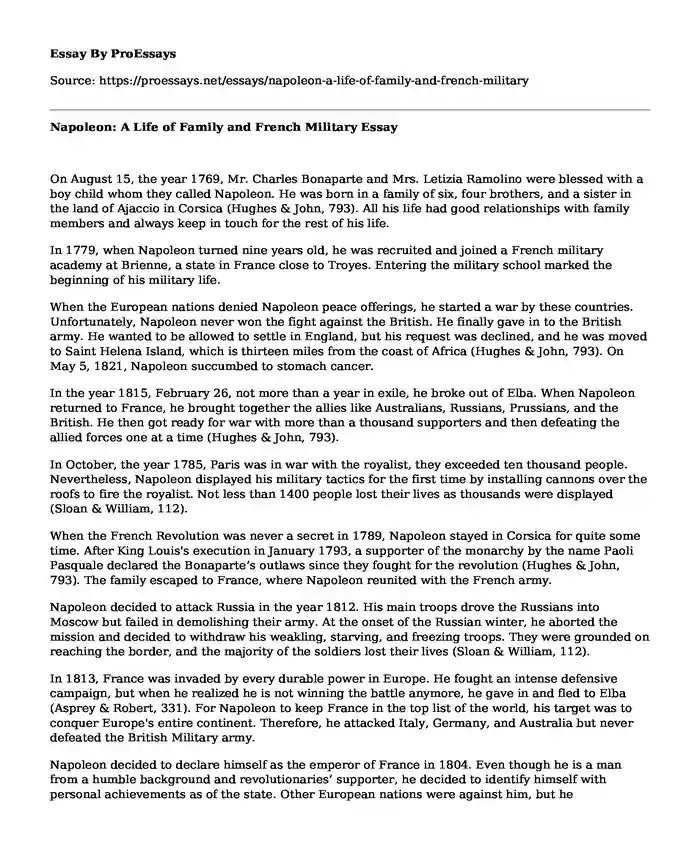On August 15, the year 1769, Mr. Charles Bonaparte and Mrs. Letizia Ramolino were blessed with a boy child whom they called Napoleon. He was born in a family of six, four brothers, and a sister in the land of Ajaccio in Corsica (Hughes & John, 793). All his life had good relationships with family members and always keep in touch for the rest of his life.
In 1779, when Napoleon turned nine years old, he was recruited and joined a French military academy at Brienne, a state in France close to Troyes. Entering the military school marked the beginning of his military life.
When the European nations denied Napoleon peace offerings, he started a war by these countries. Unfortunately, Napoleon never won the fight against the British. He finally gave in to the British army. He wanted to be allowed to settle in England, but his request was declined, and he was moved to Saint Helena Island, which is thirteen miles from the coast of Africa (Hughes & John, 793). On May 5, 1821, Napoleon succumbed to stomach cancer.
In the year 1815, February 26, not more than a year in exile, he broke out of Elba. When Napoleon returned to France, he brought together the allies like Australians, Russians, Prussians, and the British. He then got ready for war with more than a thousand supporters and then defeating the allied forces one at a time (Hughes & John, 793).
In October, the year 1785, Paris was in war with the royalist, they exceeded ten thousand people. Nevertheless, Napoleon displayed his military tactics for the first time by installing cannons over the roofs to fire the royalist. Not less than 1400 people lost their lives as thousands were displayed (Sloan & William, 112).
When the French Revolution was never a secret in 1789, Napoleon stayed in Corsica for quite some time. After King Louis's execution in January 1793, a supporter of the monarchy by the name Paoli Pasquale declared the Bonaparte's outlaws since they fought for the revolution (Hughes & John, 793). The family escaped to France, where Napoleon reunited with the French army.
Napoleon decided to attack Russia in the year 1812. His main troops drove the Russians into Moscow but failed in demolishing their army. At the onset of the Russian winter, he aborted the mission and decided to withdraw his weakling, starving, and freezing troops. They were grounded on reaching the border, and the majority of the soldiers lost their lives (Sloan & William, 112).
In 1813, France was invaded by every durable power in Europe. He fought an intense defensive campaign, but when he realized he is not winning the battle anymore, he gave in and fled to Elba (Asprey & Robert, 331). For Napoleon to keep France in the top list of the world, his target was to conquer Europe's entire continent. Therefore, he attacked Italy, Germany, and Australia but never defeated the British Military army.
Napoleon decided to declare himself as the emperor of France in 1804. Even though he is a man from a humble background and revolutionaries' supporter, he decided to identify himself with personal achievements as of the state. Other European nations were against him, but he overwhelmingly destroyed their armies at Austerlitz on December 25, 1805, remaining with the only British army on his way (Asprey & Robert, 331).
In 1798, he attacked Egypt, intending to destroy trade between Britain and India. In the process, he met other scientists who wanted to learn about the Egyptians' history and culture. In the same year, he got to Malta and secured a significant naval base, and months later, he started the war of pyramids (Asprey & Robert, 331). Although Napoleon was outnumbered in the pyramid battle, he emerged the winner, losing three hundred soldiers and killing 6000 Egyptian soldiers.
Work Cited
Asprey, Robert B. The Reign of Napoleon Bonaparte. New York: Basic Books, 2001.
Hughes, John R. "Emperor Napoleon Bonaparte: did he have seizures? Psychogenic or epileptic or both?" Epilepsy & Behavior 4.6 (2003): 793-796.
Sloane, William Milligan. Life of Napoleon Bonaparte. Vol. 1. Century Company, 1894.
Cite this page
Napoleon: A Life of Family and French Military. (2023, Nov 15). Retrieved from https://proessays.net/essays/napoleon-a-life-of-family-and-french-military
If you are the original author of this essay and no longer wish to have it published on the ProEssays website, please click below to request its removal:
- Airbus Commercial Results of Full Year 2016
- AirAsia Assets Case Study Paper Example
- Essay Example on Online Security: A Must-Have Tool to Guide Clients?
- My Journey to Becoming a Computer Lover - Essay Sample
- Research Paper on The Concorde: Shaping Aviation History in Under 4 Hours
- Air Traffic Control: Upgrading for the 21st Century - Essay Sample
- Essay Example on Amazon Fire Stick: Enhancing User Experience with Internet of Things







